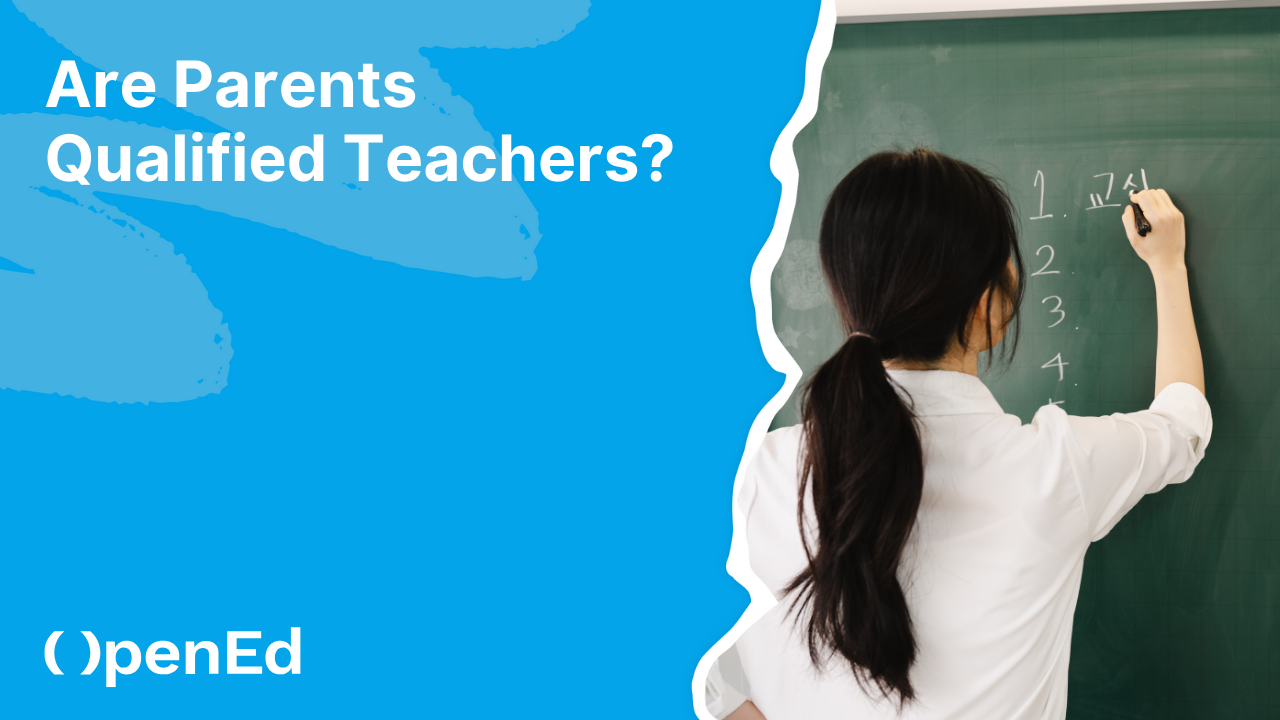"I'm not a teacher. How can I possibly homeschool my kids?"
It's a natural question, but it also reveals one of the biggest misconceptions about the nature of modern homeschooling—the idea that everyday parents are unqualified to guide the direction of their child's education.
Let’s start with some basic statistics.
Fewer than 5% of homeschooling parents have teaching degrees. The other 95% are engineers, nurses, retail workers, stay-at-home parents, and everything in between.
Even so, homeschooled students consistently score higher on standardized academic tests.
They're accepted to colleges at higher rates than their traditionally schooled peers.
And they're much more likely to have taken college classes before graduating high school than their traditionally-schooled peers.
So if teaching expertise isn't the secret ingredient, what is? Based on our conversations with educators, neuroscientists, and countless successful homeschool parents, it seems to come down to three factors:
- Creating the right environment
- Embracing learning alongside your children
- Knowing how to leverage the resources now available to parents
While the first two have been constants in home education for generations, the third factor is emerging
coming to play a more important important. The world is changing in ways that put a premium on being able to curate and architect from existing building blocks rather than seeing yourself as the sole source of knowledge.
Do You Need a Teaching Degree to Homeschool?
Before we dive into the how, let's clear up the legal question.
Do you need a special teaching credential to homeschool?
The short answer: No.
In some countries, like Germany, homeschooling requires government permission, but in the United States there's a strong legal precedent for parents' rights to direct their children's education. And not a single state in the U.S. requires parents to have a teaching degree to homeschool their children.
State requirements vary widely. Pennsylvania and New York, for example, require annual assessments and portfolio reviews. But even in the most regulated states, the only requirement is that parents are "competent" to teach, which typically means having a high school diploma or equivalent.
It's also worth noting that the landscape of home-based education has expanded beyond traditional homeschooling. OpenEd, for example, partners with public schools to offer a program where certified teachers provide oversight while parents facilitate at home, on the road, or abroad (really, anywhere with an internet connection). Technically, families enrolled in OpenEd and similar programs aren't "homeschoolers" but rather distance learning students.
We recognize that these traditional labels—homeschooler, public school student, private school student—are becoming less useful as education opens up. Most OpenEd families identify with the homeschool community and face similar challenges. What matters isn't the label but the reality: parents are taking an active role in architecting their children's education, regardless of which box the state puts them in.
The real question isn't whether you're legally allowed (you are). It's whether you can facilitate an effective education without formal teaching training. And here's where things get interesting.
Why Parents Don't Need Teaching Expertise to Succeed
"Parents don't have to be the expert," says Matt Bowman, founder of OpenEd and former educator.
In his book, Open Education: How to Reimagine Learning, Ignite Curiosity, and Prepare Your Kids for Success, Bowman advocates for what an approach where parents act more as architects than instructors; curators rather than subject experts.
"Parents create an environment filled with opportunities, resources, and support. They provide the structure and love that allow students to thrive. It's not about transferring information from your brain to theirs—it's about creating the conditions where learning naturally happens."
Corey DeAngelis, author of The Parent Revolution, also questions the assumption that homeschooling requires specialized knowledge delivery:
"You don't have to be an engineer to figure out who your math teacher is going to be. You don't have to be a dentist to choose your child's dentist. You don't have to be a surgeon to choose your child's doctor. You don't have to be formally educated in a teacher's college to choose your child's education."
DeAngelis points to something hundreds of thousands of would-be homeschoolers discovered during COVID school closures: the real barrier was confidence, not capability.
"Parents got a taste of home-based education," he explains. "The ones who never would have tried it are now never going back because they realized their kids can learn more in a fraction of the time."
So, if you don’t need either a degree or specialized education to provide for your child’s education, what does it actually take?
The Love, Limits, and Latitude Framework
Bowman distills the parent-educator role down to what he calls the three L's: Love, Limits, and Latitude. It's a framework that has nothing to do with subject matter expertise and everything to do with what parents naturally provide.
Love creates the safe environment where children feel secure enough to take intellectual risks and make mistakes.
Limits provide the structure and expectations that keep learning on track.
Latitude gives children the freedom to explore their interests and learn at their own pace—something that's nearly impossible in a classroom of 25 students.
You're not standing at a kitchen whiteboard explaining polynomial equations. Instead, you're finding the right resources—whether that's an online curriculum, a tutor, or a YouTube video—that can teach effectively. Your job is ensuring your child engages with the material and being available when they get stuck.
Think of it this way: When your child learned to walk, you didn't need a degree in kinesiology. You provided encouragement, caught them when they fell, and celebrated their successes. Teaching them to read, write, or solve math problems follows the same principle—just with different resources at your disposal.
The Learning Together Method: When You Don't Know the Subject
One of the most liberating realizations for new homeschool parents is that you don't need to know everything before you start. In fact, learning alongside your child can be one of the most powerful educational approaches.
Meg Thomas, a homeschool coach with 18 years of experience and seven children, shared her refreshingly honest perspective on the OpenEd podcast: "I never learned how to diagram sentences. I couldn't have told you what an adverb was. A lot of the times when I was teaching my kids, I was learning it for the very first time."
Thomas doesn't have a formal education degree.
"I got married young and started having babies quick," she explains. "I just got to learn right there with them. And there was a beauty in that—it was my first time learning these things too."
This approach shows your children that learning is a lifelong process. When kids see their parents puzzling through problems and discovering new concepts, they understand that not knowing something isn't a failure—it's an opportunity.
Furthermore, the game has completely changed with modern technology. Thomas describes her current approach: "With ChatGPT, you can grab your phone and take a picture of a math problem and say, 'explain this answer to me like I'm a third grader.' When I do school with my big kids, I just have my phone there so I can look stuff up right then and there."
Having expertise in a subject doesn't even make you the best person to teach it to your child. Teaching children requires a different skill set than subject mastery—it requires patience, the ability to break down complex concepts, and understanding how young minds process information. Sometimes your expertise can even get in the way of seeing where a beginner might struggle.
When to Bring in the Experts: The Minecraft Lesson
When OpenEd CEO Isaac Morehouse interviewed Amir Nathoo, CEO of Outschool, they discovered they'd both faced the exact same challenge: helping their sons learn Minecraft modding.
Nathoo, despite being a software engineer, found himself stumped: "I can program, but Minecraft modding? It's very complicated unless you invest significant time."
He ended up hiring a Minecraft tutor through his own platform.
Morehouse, who isn't technical at all, had the same experience. His seven-year-old wanted to create Minecraft mods, and no amount of ChatGPT assistance could replace dedicated instruction.
"I found a class on Outschool," Isaac explained. "After six weeks, my son was showing me custom blocks he'd created."
The lesson here extends far beyond Minecraft. Whether it's advanced mathematics, a musical instrument, or any area where your child shows particular interest or giftedness, sometimes the best thing you can do is find someone who specializes in making that subject accessible to young learners.
The beauty of platforms like Outschool is that they're completely modular—you don't need to commit to a full curriculum or semester. You can book a six-week series on Minecraft modding, a one-time class on hair braiding, or ongoing tutoring in specific subjects. Classes typically cost between $10-40 per session, far less than local in-person tutoring, and you can pick and choose exactly what gaps you need to fill.
This flexibility becomes even more critical as education evolves in directions older generations might not fully grasp—kids growing up AI-native, immersed in technologies we're just beginning to understand. While we need to adapt to these new realities, we also need to guide children toward skills of enduring importance: critical thinking, basic literacy and numeracy, and most importantly, curiosity about the world around them.
Three Paths to Learning: Self-Paced vs. Instructor-Led
There is a vast variety of educational resources accessible to homeschoolers. We might break these down into three basic categories (and most families use at least two):
1. Self-Paced, Student-Led Learning
These are curricula and platforms where your child can work independently, with the material itself doing most of the teaching.
Laura Feller, a homeschool parent featured on the OpenEd podcast, had worried that her teenager would never advance past the level she had achieved as a student who struggled with math. However, she found her solution in Math-U-See. The curriculum came with comprehensive video lessons for every concept, and when she needed extra help, their support line provided real human assistance. "My youngest son may get to calculus and this curriculum will help him do that," she explained, "because I certainly won't be able to."
Popular Self-Paced Options Available Through OpenEd:
The OpenEd marketplace offers numerous self-paced curricula including BYU Independent Study, Teaching Textbooks, and specialized programs from providers like OnFire Learning and Knowledge Pillars. Families can browse current options and use their OpenEd funds to access whichever resources best fit their needs.
Other Strong Self-Paced Programs:
- Khan Academy (Free): Complete K-12 curriculum with practice exercises
- Time4Learning: Automated lessons and grading with parent reports
- Power Homeschool: Adaptive technology that identifies and fills learning gaps
- IXL: Skills-based practice that adapts to student level
2. Instructor-Led Learning
These options provide real teachers—either through video or live interaction—taking the teaching burden completely off parents.
Live Online Classes:
- Outschool: Thousands of live classes on academic and enrichment topics
- Varsity Tutors: One-on-one tutoring in any subject
- Wiingy: Affordable tutoring starting at $19/hour
3. Parent-Led Learning
These options position parents as the primary facilitator of learning, with carefully designed curricula that guide you through teaching each subject without requiring prior expertise.
Popular Parent-Led (Secular) Curricula
- Curiosity Chronicles: Conversational history curriculum with scripted dialogues for parent and child.
- Math Mammoth: Parent-directed, workbook-style curriculum with scripted explanations.
- Beast Academy (by Art of Problem Solving): Parent-guided comic-style math program, rigorous but very engaging.
- Moving Beyond the Page: Project-based, literature-rich curriculum designed to be secular and inquiry-driven. Especially strong for gifted or creative learners.
These curricula understand that most parents aren't trained teachers and provide everything needed to guide lessons effectively—including scripts, discussion questions, and teaching tips for those new to homeschooling.
If You Want to Learn Advanced Teaching Skills
While you don't need to become a trained teacher, some parents find value in developing their teaching skills. The focus here isn't on subject expertise but on general educational strategies.
Claire Honeycutt, a neuroscientist turned homeschool advocate, offers recorded workshops with titles like "You Can Teach Math" and "You Can Teach Reading"—not because you need to master these subjects, but because understanding how children's brains process information can make you more effective.
Simple K12 also provides a flexible membership with 1,000+ short courses on topics relevant to both classroom and home educators. A few examples that stand out for homeschool parents:
- Differentiation 101 — how to adapt lessons for kids with different learning styles and abilities.
- Beyond Academics: Social and Emotional Learning Needs in the Classroom — strategies to help children manage emotions and build resilience.
- Ignite Student Passions: Turning Ideas into Inspiring Projects — practical ways to harness curiosity and channel it into meaningful work.
The key insight: These resources teach you how to teach, not what to teach. The "what" is typically handled by curricula, online instructors, and educational platforms.
The Path Forward
At OpenEd, we've built our entire program around the reality that most parents aren't formally-trained teachers—and don't need to be. Through partnerships with public schools, we provide:
- Funding for curriculum and resources: Access the tools that work for your family
- Certified teacher support: When you need educational guidance, not lectures
- Simple compliance: We handle the paperwork so you can focus on learning
- Community connections: Join thousands of families on the same journey through virtual clubs
- Flexibility to choose: Mix and match resources to create your perfect blend
The beauty of modern homeschooling is that you're never really doing it alone. Between self-paced curricula, online instructors, AI assistants, and support communities, you have more resources than any generation of parents in history.
You don't need to be a teacher. You just need to be what you already are—a parent who cares enough to ensure your child gets the education they deserve.
Ready to explore homeschooling with full support? Apply to OpenEd today or attend a free information session.
Subscribe to The OpenEd Daily
Join 20,000+ families receiving curated content to support personalized learning, every school day.
.webp)

.avif)


.png)
.png)
